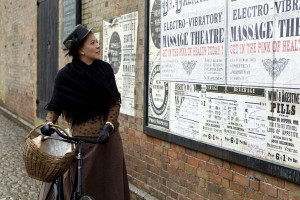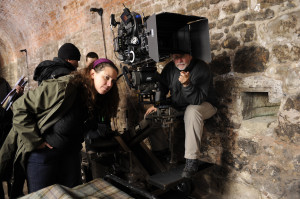
You’ve probably heard this story before: An uptight but well-meaning professional slowly but surely falls in love with his boss’ sharp-tongued, fiercely independent daughter. Such is the premise of Tanya Wexler’s newest film, “Hysteria,” starring Hugh Dancy and Maggie Gyllenhaal as the reluctant lovers. The catch? Set in Victorian England, Wexler’s uproarious film boasts an unlikely historical backbone that most romantic comedies lack: the invention of the vibrator by Dancy’s character, Dr. Mortimer Granville.
“It was a movie I wanted to see, and it didn’t exist,” said Wexler of why this particular project drew her out of the 10-year filmmaking hiatus she took to start a family. “It made me laugh instantly, [but] it’s also an empowerment narrative.”
For those who aren’t quite up to speed on their, ah, history of sex accessories, the vibrator was invented in late eighteenth-century England and adopted as a treatment for “hysteria,” a catch-all diagnosis for women of the era. Doctors like Granville associated their symptoms (including weeping, nymphomania, frigidity and anxiety) with problems with their uteruses and, in a completely nonsexual way, treated them with “massages.”
“Neither men nor women really had a concept of women having orgasms,” explained Wexler. “There was no guys-taking-advantage-of-ignorant-women. Everyone was kind of equally naive in thinking, ‘Something’s wrong with women – apparently most of them – and it’s because their uterus is wandering around in their body and, if we just give them a massage, they will feel better.’”
“It’s a pretty good massage, I would guess,” she continued. “And if you don’t think there’s anything naughty, and that’s what you’re supposed to do to function, then it’s much better than getting leeched or whatever else.”
So, yes, Victorian doctors doled out “manual massages” as legitimate medical treatments, which is why the vibrator gained popularity as a time- and energy-saving device.
“The vibrator was invented for a man,” Wexler said. “And in that, I mean it was a labor-saving device for a guy because his hand got tired.

“If you read Rachel Maines’ book ‘Technology of Orgasm,’ she says that these treatments often went on for an hour or sometimes more,” she added.
Now that is one hell of a massage. But I digress. As much as “Hysteria” might appear to be about sex from my enlightening discussion with the film’s director, it also has a lot to offer in the form of social and political commentary. Gyllenhaal’s character, for example, denounces her upper-class privilege in favor of charity work and supporting women’s rights.
“People want things that are new and fresh, but at the same time they’re scared because they don’t know how to put it out there in the world,” Wexler said of her seven-year struggle to get the film into production.
“I think the reason ‘Hysteria’ is tricky is that it’s set in Victorian England but it’s not a period piece,” she said. “It’s a pretty contemporarily paced and thought-through romantic comedy that, because of the facts of history, happens to be set in [the past].”
Having viewed the film at its premiere last year at the Toronto International Film Festival, where it was one of my personal favorites, I can attest that it feels refreshingly relatable.
“I don’t think Victorian people sat around thinking, ‘Aren’t we quaint in our cute little dresses and our silly ways?’ Wexler said. “They thought, ‘Electricity is coming! We’re on the cutting edge of medicine and women’s rights and science! This is the most exciting time to be alive!’
“Well that sounds very familiar to me,” she added. “It sounds like now.”
Indeed, many of the attitudes expressed in the film toward changing technologies and social mores are sure to hit pretty close to home in a way that manages to feel simultaneously humorous and poignant. Who knows, maybe in another century, some new generation of bright young filmmakers will be satirizing us in 2012.

“My friend calls this film the ‘thinking woman’s romantic comedy,’” said Wexler, who studied psychology at Yale University before receiving her M.F.A. in film at Columbia.
“[I’m] not trying to solve all the problems of gender inequality and whatever; I’m just trying to have a laugh and have something that includes me.”
“Hysteria” hits theaters on May 25.
